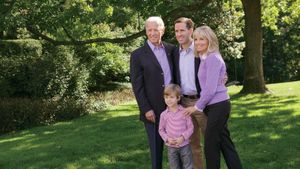For many Americans, the idea of moving to Canada has often been floated as not just a dream, but as a means of escape from political turmoil back home. This sentiment has seen spikes particularly during presidential elections, with interest often leading to expectations of easy relocations. Yet, the reality of relocating to Canada is far more complex than merely packing up and moving across the border.
Take the aftermath of the 2020 U.S. presidential election as an example. The election season saw heightened anxiety among many left-leaning Americans about what another term for Donald Trump could mean. Randall Cohn, an immigration lawyer based in Vancouver, reported receiving numerous calls from distressed Americans seeking guidance on how they could relocate to Canada. Interestingly, this wave wasn’t just limited to the lead-up to the elections; post-election, there was still considerable interest.
Cohn described the phenomenon as cyclical, pointing out similar spikes during past Republican victories, noting, "The surge reduced a little bit after [Kamala] Harris became the nominee, and then I got another surge in the last couple weeks." Meanwhile, after Trump secured his win on November 5, Google Trends indicated over a 1,000 percent increase in searches related to moving to Canada. Following his 2016 election victory, Canadian immigration websites were similarly overwhelmed.
Experts highlight the challenges faced by those wishing to make such moves. While interest may peak, the actual number of Americans who move to Canada due to these elections remains relatively low. Despite the attractive prospects Canadians may offer—such as universal healthcare and progressive social policies—the immigration process is often riddled with hurdles, especially for those without ties to Canada.
According to Jacqueline Bonisteel, who works at the Corporate Immigration Law Firm, "Somebody with no pre-existing connection to Canada is going to have a really, really difficult time." This echoes findings from organizations specializing in immigration law, underscoring the challenging reality of shifting one’s life across borders.
Cohn pointed out another misconception: the belief among some individuals, often those with significant financial means, who think they can simply "buy" their way to residency. He clarified, “It’s not as easy as you think it is and there’s no way to buy residency.” This notion reflects broader misunderstandings about the legal and logistical realities of immigration.
Shanthony Exum, an artist who made the leap from Brooklyn to Montreal during the pandemic, shared her personal account of the fierce challenges within the immigration sphere. For her, the move was borne of both political and personal motivations. She remarked about the process being "daunting...exhausting (and) expensive," offering caution to those considering relocation for political reasons. “Trump's policies are terrifying to me but moving wasn’t solely motivated by them,” she noted.
Exum’s fondness for Montreal played a significant role during her immigration experience, especially as she navigated the many bureaucratic and emotional hurdles. Compounded by the backdrop of the pandemic, where the realities of New York City’s struggles were ever-present, her decision also echoed broader sentiments among those desiring change.
The challenges don’t just stop at legalities. Cultural adjustments and personal connections add another layer to the experience of relocating. Americans often face issues integrating socially and emotionally, balancing their roots with the new environment. Even when the desire to escape political strife is strong, acclimatising to new surroundings can prove challenging.
The Canadian immigration system demands not only financial resources but also patience and determination. People seeking to relocate must present clear cases for why they wish to move, navigate through comprehensive application processes, and often undergo long waiting periods—all trials dissuading many from pulling the trigger on their plans.
Despite this, the conversations about relocating to Canada continue to flourish among Americans, showcasing the intertwined relationship between politics and migration. There is also the unshakeable notion of hope—hope for stability, for a fresh start, and for the potential of a more welcoming future. Yet, the reality remains: While the grass may seem greener on the other side, the path to traversing it can be far from easy.
Canada’s increasingly competitive immigration policies reflect the notion of being selective. With increased global migration due to factors such as climate change and economic instability, countries, including Canada, are tightening their policies to manage the influx of newcomers. This trend raises questions about not just policies but also the future of immigration as political climates shift worldwide.
Adding to the complexity is the rise of misinformation surrounding immigration processes, often propagated through social media and politically charged dialogues. Misconceptions about what is possible can lead to frustration when reality sets in, leaving individuals feeling overwhelmed. Bonisteel highlighted how many hopeful emigrants often arrive under-prepared, imagining their immigration will be simple—all too often, it isn’t.
Another layer to the tranquility offered by Canada is found through hearing the voices of immigrants themselves. Many immigrants describe their experiences as having transformative power, fueled not just by the fabric of Canadian society itself but also the empowerment of successfully overcoming substantial challenges.
Through the lens of individuals like Exum, the immigration narrative evolves from merely escaping uncomfortable realities to finding new roots, new cultures, and new experiences. Her story reflects the push-pull dynamic at play, moving beyond mere politics to embrace her passion for artistry and creativity, combined with the freedom found within Canadian culture.
Yet, for many, these narratives serve as cautionary tales. The desire to flee political divides doesn't always translate to the immediate satisfaction of the relocation dream. Instead, it reveals the delicate balance between hope and the arduous work of reshaping one's life.
While the allure of Canada remains strong, the call for intuitive policies and public awareness becomes more pronounced than ever. Citizens and governments alike will need to grapple with these complex migration patterns as political turmoil continues to influence the way people think about their homes and futures.
For those contemplating the leap across the border, having realistic expectations becomes imperative. Recognizing the exhaustive planning involved, along with the potential for emotional upheaval, is key to approaching the idea of relocation from the right perspective.
Canada can offer safety and stability, but the process needs recognition as more than just escaping one nation’s political climate—it's about forging new ties, sustaining patience, and building connections to fully embrace the new chapter of life across the border.
At the core, the heart of the matter remains clear: relocation is seldom merely about fleeing chaos, but about cultivating, striving, and realizing potential within new contexts. The optimistic refrain of “moving to Canada” should come paired with the hallmark of introspection, preparation, and commitment to the process itself.



